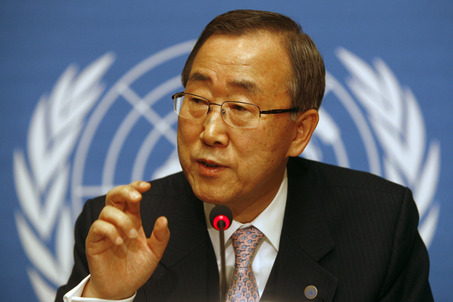UN warns CAR on brink of catastrophe

UN officials are warning the Security Council that Central African Republic (CAR) is on the brink of a catastrophe, with half the population made homeless since ethnic warfare broke out.
UN political affairs chief Jeffrey Feltman told the council on Monday that about 2,2 million people throughout the country need assistance, about half the total population.
About half the people of Bangui have been driven from their homes, a total of about 513,000, he said. An estimated 100,000 people are seeking shelter at a makeshift camp at the airport near the capital.
The Central African Republic has been plunged into chaos as the country’s Christian majority seeks revenge against the Muslim rebels, who seized power in a coup in March. Fighting between Christian and Muslim militias intensified in December.
An attack on Bangui by the Christian militia calling itself the anti-Balaka on December 5 triggered heavy unrest in the capital, Feltman said.
A report in late December by Secretary General Ban Ki-moon reported 600 deaths in Bangui in those attacks, and Feltman put the current total at “750 casualties’’ in the capital.
“The death toll outside Bangui is likely to be substantial,’’ he said. “Killings in Bangui and the rest of the country continue every day, and the population remains divided along religious affiliation,’’ Feltman said.
The UN Children’s Fund warned at the end of December, that children are being recruited into the militias, and verified the killings of at least 16 children since December 5, two of whom were beheaded.
In December the Security Council authorised a multinational African peacekeeping force, which is expected to increase its troop strength from about 2,500 to 3,500, to keep a lid on the violence. France sent in about 1,600 troops on December 9.
Meanwhile, Mali and Senegal have repatriated hundreds of their nationals fleeing sectarian violence in the Central African Republic, officials in Bamako and Dakar said on Monday.
In the Malian capital Bamako the minister in charge of expatriate Malians, Abdramane Sylla, and two other officials welcomed a group of nearly 270 people who returned in a plane chartered by their government.
Mali’s ambassador to Gabon, Diadie Yacouba Dagnoko, who travelled with the evacuees from Bangui, put their exact number at 267.
Another flight repatriated the same number of Malians yesterday, Sylla said, adding that more flights could be added as about 3,000 Malians were living in the Central African Republic. But so far only over 500 had signalled they wanted to return to Mali, he added.
Most of those repatriated were women and children, many born in the troubled country to Malian-origin parents who had been living there for a long time.
Senegal said it had repatriated nearly 600 of its nationals in less than a week, according to the authorities in Dakar.
Senegal’s APS news agency reported that Dakar also evacuated Guinean, Malian and Gambian nationals trapped by the conflict in the Central African Republic but did not give their number.
Nigeria said on Sunday it was repatriating over 1,600 citizens who had sought refuge in its embassy in Bangui.
The resource-rich but impoverished Central African Republic has been wracked by ever-escalating violence since a March coup by the mostly Muslim Seleka rebels installed Michel Djotodia as the country’s first Muslim president.
Although Djotodia disbanded the rebels, some of them went rogue, leading to months of killing, rape and pillaging and prompting Christians to form vigilante groups in response.
French and African Union troops have been struggling to restore order in the nation since receiving a UN mandate last month.
More than 1 000 people have been killed in the past month alone, while nearly a million have been displaced since the coup. — AFP.











Comments